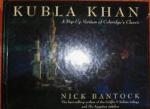|
This section contains 2,748 words (approx. 10 pages at 300 words per page) |

|
SOURCE: “Coleridge's Mandala,” in Southwest Review, Vol. 66, No. 4, Autumn, 1981, pp. 404-10.
In the following essay, King analyzes “Kubla Khan” in the context of Carl Jung's theory of the structure of the human psyche.
The Age of Enlightenment was one of those recurring periods in the history of Western man during which Reason attempts to swallow all the affective states of personality and is, for a time, apparently successful. During this particular era, the intellectually elite firmly believed that Reason and his elder son, Science, would not only solve all of man's problems but also make possible the full realization of his potential. When the great god Reason failed, as he was fated to do, Western man, led by the Romantic rebels, sought to become whole again through the restoration to human personality of the intuitive and the affective. That he ofttimes went to the extreme in this direction...
|
This section contains 2,748 words (approx. 10 pages at 300 words per page) |

|


